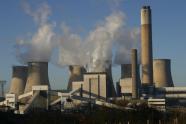Climate Change: Optimizing Regulatory and Market Forces

Caught in the shelling between those who think
that addressing climate change is urgent and those
who think such action is farcical, voters are
thoroughly confused. The issue has become
increasingly partisan with fossil fuel interests
funding one side and green technology providers
bankrolling the other.
Beyond the money and the loud voices that seek to
distort the debate, some important environmental and
economical factors are surfacing. Consider the
severe summer heat waves and the subsequent
droughts, all of which has hurt food production this
year. Then add to that the number of typhoons
rolling across Asia, and it is fueling concerns that
man-made global warming is dawning right now.
“Climate change is not a hoax,” says President
Obama, during his acceptance speech at the
Democratic National Convention.
The Obama administration is enacting stricter air
quality rules that also include greenhouse gas
restrictions, all to encourage a shift away from
older technologies and into cleaner ones. But those
“man-made” actions may pale when compared to the
market forces that are causing electric generators
to use far more natural gas and far less coal.
Tougher rules are, in fact, giving natural gas
facilities a leg up over the competition. But cheap
and abundant natural gas supplies are also providing
the fuel source a natural advantage.
The result is that carbon dioxide emissions in the
United States are less than what they were 20 years
ago, even though more people are using more energy.
The U.S.
Energy Information Administration is saying that
such releases will be 9 percent less this year than
they were in 2007, or before the recession hit.
Why? Coal-fired power had once provided about half
of the electric generation market. Now is about 45
percent, and falling. At the same time, natural gas
from shale is rising, providing 30 percent of
overall net generation. In 20 years, the energy
agency expects shale to provide 45 percent of
electric power. Meantime, modern combined-cycle
natural gas generators are efficient and create less
less pollution. That’s all on top of the fact that
natural gas, generally, releases half the overall
emissions as coal, including carbon dioxide.
Economic Improvement
Certainly, people of goodwill disagree over whether
climate change is the culmination of industrial
activity or whether it is a naturally-occurring
phenomenon. The discussion, though, has become
politicized and driven in large part by PR campaigns
and political contributions -- not necessarily by
the climatologists who are motivated by pure
science.
Even true believers on both sides are divided over
the tactics they should each use. A story written
for
Politico by Stanford University journalism
professor and former New York Times writer Joel
Brinkley juxtaposes the views of two
environmentalists: Bill McKibben, who heads the
350.org that is best known for trying to halt
the Keystone Pipeline and Fred Krupp, who leads the
Environmental Defense Fund.
McKibben is quoted as saying, “On our planet, growth
may be one big habit we finally must break.” But
Krupp responds, “Let’s not live in a dream world
where capitalism can be voted out of office.”
No doubt, the two agree that global warming is an
immediate threat. Indeed, Brinkley, who is a
relative of this reporter, goes on to cite some
compelling data: NASA is reporting that Greenland’s
massive ice sheet thawed this summer while it is
also saying that 13 percent of the earth's surface
is now experiencing extreme summer heat. Meantime,
the National Snow and Ice Data Center says that the
sea ice in the Arctic has fallen to the lowest level
ever measured.
What’s next? Denying economic productivity is not
the solution. And so the answer then rest with the
degree to which our elected officials establish the
regulatory nuances in relation to the existing free
market forces. It is about optimizing the
intersection between ecological and economic
concerns.
“Government has always, and I think we can expect it
always will, advance certain technologies that it
thinks are worthwhile, not withstanding pure
economics,” says Doug Egan, chairman of Competitive
Power Ventures. “It’s a bit of a mixed bag but it is
predominated by economics.”
Both President Obama and GOP-hopeful Mitt Romney
would each tilt the playing field based on their
exercise of the regulatory levers and the allocation
of the treasury’s coffers. But the aggressive
entrance of shale gas is a potentially more powerful
scenario, negating the notion that reducing carbon
dioxide emissions and improving industrial
production are at eternal odds.
EnergyBiz Insider has been awarded the Gold for
Original Web Commentary presented by the American
Society of Business Press Editors. The column is
also the Winner of the 2011 Online Column category
awarded by Media Industry News, MIN. Ken Silverstein
has been named one of the Top Economics Journalists
by Wall Street Economists.
Twitter: @Ken_Silverstein
energybizinsider@energycentral.com
Copyright © 1996-2012 by CyberTech, Inc. All rights reserved.
To subscribe or visit go to: http://www.energycentral.com
To subscribe or visit go to: http://www.energybiz.com